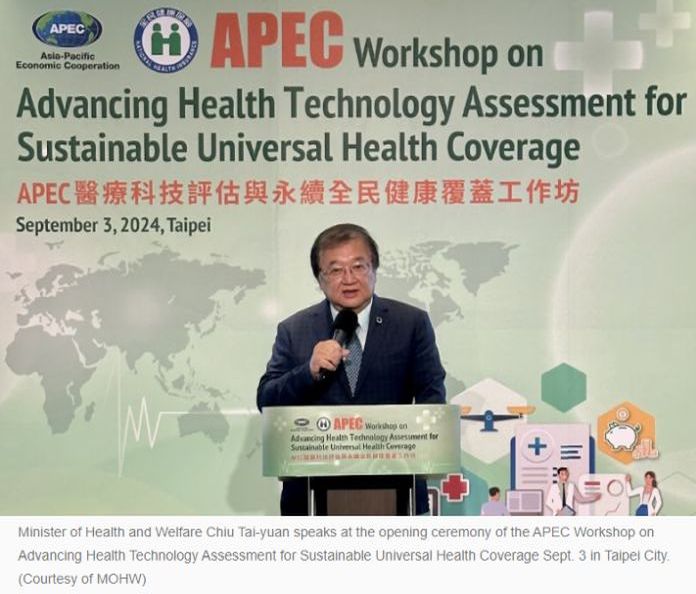By Alison Hsiao
TAIPEI, Taiwan, (CNA) – Cooperation between Taiwan and Japan is increasingly crucial as supply chains become shorter and more regionally focused, a leading compound semiconductor company chairman said on Friday at a Taiwan-Japan exchange forum.
Dennis Chen (陳進財), chairman of WIN Semiconductors Corp., a leading compound semiconductor manufacturer, said the global division of labor has been disrupted by the US-China trade and tech war.
“We have come to a point where there is no turning back, no matter who wins the presidency [in the next US presidential election],” he said at the forum at SEMICON Taiwan, an annual semiconductor expo in Taipei.
However, localizing semiconductor manufacturing – widely regarded as a strategic resource – is easier said than done, as “every country has its speciality following 40 years of supply chain [globalized] development,” Chen said. Taiwan and Japan are highly complementary in terms of their supply chain division of labor. Taiwan is top in foundry and advanced packaging, and Japan leads in materials and equipment,” he said, citing Japan’s official numbers showing that it has 48 percent of the semiconductor material global market share and 31 percent of the equipment market share.
The chairman said that the two countries are also geographically and culturally close to each other, especially in terms of attitude to work. As well as having complementary dominant supply chain positions, Taiwan and Japan are both on the side of democracy as “geopolitical changes have divided the world into two camps.”
In this camp of democracy, more cooperation with the United States, Europe, South Korea, and Southeast Asia in forming a new supply chain is expected. Chen also noted that customers in the US have urged his company to implement the “Taiwan plus one” strategy – manufacturing bases outside Taiwan.
In response to the pressure, “I believe Taiwan and Japan can take our cooperation to another level as we are natural partners in the industry,” he said.
At the same forum, William Liu (劉威廉), deputy director-general of the ministry of economic affairs’ bureau of foreign trade, said 40 percent of the US$75.7 billion of bilateral trade between Taiwan and Japan last year was semiconductor-related.
“It shows the semiconductor supply chain is the pillar of our bilateral relationship,” he said.
Liu said that as major Taiwanese enterprises such as Taiwan Semiconductor Manufacturing Co. (TSMC), UMC, and Powerchip Semiconductor Manufacturing Corp., invest in Japan, “the ministry has been designing methods to assist Taiwanese small and medium companies to join them. We are helping them negotiate with the local governments [in Japan] for support, resources, tax incentives and subsidies,” Liu added.
The Japan-Taiwan Exchange Association Taipei Office Deputy Representative Takashi Hattori and officials from Japan’s Kumamoto also attended the forum.

Meanwhile, the ministry of health and welfare; National Health Insurance Administration (NHIA) hosted the APEC Workshop on Advancing Health Technology Assessment for Sustainable Universal Health Coverage on September 3 in Taipei City to discuss the building of stable health ecosystems, reports Taiwan Today.
In addition to representatives from 12 other members of the Asia-Pacific Economic Cooperation, the NHIA invited experts from the UK’s National Institute for Health and Care Excellence to deliver talks. Officials from the ministry of health and wellness of Taiwan’s Caribbean ally Belize were also in attendance to discuss how medical services could be enhanced through the adoption of health technology assessment.
MOHW Minister Chiu Tai-yuan noted that the application of health technology assessment could clarify whether new drugs, special medical materials and innovative services are beneficial to citizens.
The NHIA said that Taiwan’s Center for Health Policy and Technology Assessment was launched January 1 this year to expedite the incorporation of new medicine into the national health insurance system, while also serving as a bridge for exchange with global counterparts.
The NHIA workshop focused on the role of health technology assessment in facilitating universal health coverage, stories of the methodology’s impact and ways to advance it despite challenges.
The NHIA arranged for the seminar’s attendees to visit the Taipei-based Center for Drug Evaluation and the Taoyuan City-based Linkou Chang Gung Memorial Hospital on September 4 to gain insight into Taiwan’s achievements in health technology assessment.





